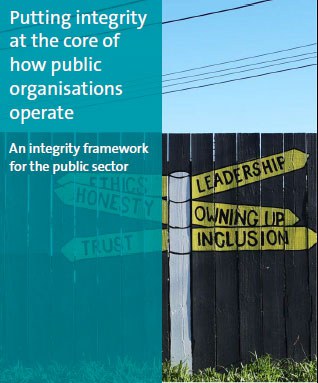The six ways of working
Please note: There is an updated version of this framework.
 Ongoing commitment
Ongoing commitment
To achieve and maintain a culture of integrity, there must be strong commitment from leadership that integrity is at the core of an organisation – the foundation that everything else is built on.
Leaders are always being watched – their actions and behaviour influence the culture of an organisation more than policies or processes ever can. When all leaders in an organisation collectively commit to take every opportunity to demonstrate the values of their organisation and emphasise the importance of integrity, they can have a significant impact.
Such a commitment must be authentic and consistent, regardless of the pressures that leaders are under. However, integrity in a workplace is not just the responsibility of leaders, it is important that it is everyone's responsibility.
Cultural change of the magnitude contemplated by this review takes persistent and consistent effort to embed. Building on the work the firm has already begun, it is imperative that the Board, Chief Executive, and every partner are committed to the proposed transformation of the firm’s culture and that they have a 10-year plan to implement, monitor, and audit the change.
Bazley, Dame Margaret (2018),
Independent review of Russell McVeagh
 Build alignment
Build alignment
The vision, values, and expected behaviours of an organisation should be consistently reflected in all its policies, processes, and controls even in times of pressure. Staff should not be given tasks that can be achieved only if some aspect of the integrity system is compromised.
Building alignment also requires working in a co-ordinated way across the organisation, with everyone working towards the organisation's commonly understood and shared purpose.
Staff had to spend money at an unprecedented speed. They made use of emergency procurement provisions and did everything possible to keep the just-in-time delivery as robust as possible… All this activity was layered on top of a solid foundation – strong systems that were already in place, combined with good judgement and integrity of Ministry staff. This pandemic really showed the importance of always reinforcing integrity in an organisation.”
Leading with integrity during lockdown: Starting with Zoom and ending with zombies, TINZ Leaders Integrity Forum blog post, August 2020
 Prioritise relationships
Prioritise relationships
Cultures are forged on relationships and play out through the different networks in a workplace – individual engagement, group dynamics, relationships among groups, and interactions with external organisations.20
Efforts to change culture need to consider the way relationships are formed and maintained between and within groups in the workplace as these can directly affect trust – positively or negatively.
Workplaces with a strong culture of integrity focus on improving honest, trustful, respectful, and open relationships. They enable difficult conversations where needed and encourage respect and diversity of thought. This can also be expressed by the tikanga concept of manaaki, to look after the mana of others by showing respect, hospitality, generosity, and care for others.
… DHB staff raised concerns about the procurement process and the proposed contract with HealthTap as soon as they became aware of it… Office of the Auditor-General (2019), Inquiry into Waikato District Health Board’s procurement of services from HealthTap
 Provide transparency
Provide transparency
Integrity depends on transparent processes and decision-making. Transparency requires workplaces to be open about actions taken, decisions made, processes being put in place, and progress being made. Leaders who show a willingness to explain decisions or have them reviewed help demonstrate fairness and equity in the organisation.
This is important externally too. Organisations need to be transparent in sharing data, information, knowledge, and insights about their performance. Openly monitoring and reporting on performance supports accountability.
In many cases Wintec has been unable to provide an account of how it has spent public money [on international travel] … Senior executives of public entities must be transparent about, and accountable for, the expenditure they incur.
Audit New Zealand (2019), Report to the Council: Additional assurance work on travel expenses, redundancy and
severance payments
 Make it easy
Make it easy
Achieving a culture of integrity for an entire organisation is not easy. It is important to understand what behaviours in an organisation are encouraged, intentionally or not, to ensure that unforeseen barriers are not created.
Behavioural research shows that there is often a gap between our intentions and our behaviours. Some of this can be put down to "friction costs" – the things that make a task more difficult to complete.
Making integrity easy in a workplace means designing processes and policies around people and ensuring that it is easy to "do the right thing".
Seeking feedback from staff about what is working and what is not can help to ensure that a workplace's systems and processes are easy to navigate and make it clear what is expected.
Having digestible policies and procedures has been an important change for us. Before we had hundreds of pages of rules. These have been replaced over time by fewer and more principles-based policies.”
Government department manager
 Be inclusive
Be inclusive
Staff participation is essential for effective and positive changes to a workplace's culture. Workplaces that encourage and value the participation of staff in decision-making processes support strong performance, innovation, organisational resilience, organisational integrity, and better staff well-being.
Culture change within organisations is challenging and takes time. In this context, it is essential to hear the voices of the people, even if the messages are hard to hear.
Teale D and MacDonald C (2020), Independent Review of the New Zealand Defence Force’s progress against its Action Plan for Operation Respect
20: Taylor, Alison (2017), The Five Levels of Ethical Culture (working paper), BSR.

